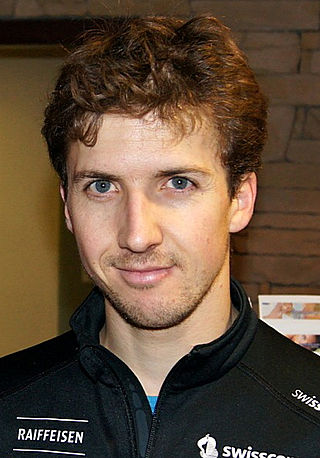
The modern Olympic Games are the world's leading international sporting events. They feature summer and winter sports competitions in which thousands of athletes from around the world participate in a variety of competitions. The Olympic Games are considered the world's foremost sports competition, with more than 200 teams, representing sovereign states and territories, participating. By default, the Games generally substitute for any world championships during the year in which they take place. The Olympics are staged every four years. Since 1994, they have alternated between the Summer and Winter Olympics every two years during the four-year Olympiad.

The Winter Olympic Games, also known as the Winter Olympics, is a major international multi-sport event held once every four years for sports practiced on snow and ice. The first Winter Olympic Games, the 1924 Winter Olympics, were held in Chamonix, France. The modern Olympic Games were inspired by the ancient Olympic Games, which were held in Olympia, Greece, from 776 BCE to 394 CE. The Baron Pierre de Coubertin of France founded the International Olympic Committee (IOC) 1,500 years later in 1894, leading to the first modern Summer Olympic Games in Athens, Greece in 1896. The IOC is the governing body of the Olympic Movement, with the Olympic Charter defining its structure and authority. The original five Winter Olympic Sports were bobsleigh, curling, ice hockey, Nordic skiing, and skating. The Games were held every four years from 1924 to 1936, interrupted in 1940 and 1944 by World War II, and resumed in 1948. Until 1992, the Summer Olympic Games and the Winter Olympic Games were held in the same year. A decision to change this was made in 1986, when during the 91st International Olympic Committee session, IOC members decided to alternate the Summer Olympic Games and the Winter Olympic Games on separate four-year cycles in even-numbered years. Also, at that same congress it was decided that 1992 Winter Olympics would be the last to be held in the same year as the Summer Games and that to change the rotation, the games that would be held in 1996 would be brought forward by two years, being scheduled to 1994. After those games, the next were to be held in 1998 when the four-year Olympic Cycle resumed.

The 2002 Winter Olympics, officially the XIX Olympic Winter Games and commonly known as Salt Lake 2002, were an international winter multi-sport event that was held from February 8 to 24, 2002, in and around Salt Lake City, Utah, United States.

Ole Einar Bjørndalen is a retired Norwegian professional biathlete and coach, often referred to by the nickname, the "King of Biathlon". With 13 Winter Olympic Games medals, he is second on the list of multiple medalists behind Marit Bjørgen who has won 15 medals. He is also the most successful biathlete of all time at the Biathlon World Championships, having won 45 medals. With 95 World Cup wins, Bjørndalen is ranked first all-time for career victories on the Biathlon World Cup tour. He has won the Overall World Cup title six times, in 1997–98, in 2002–03, in 2004–05, in 2005–06, in 2007–08 and in 2008–09.

The 2002 Commonwealth Games, officially known as the XVII Commonwealth Games and commonly known as Manchester 2002, were an international multi-sport event for the members of the Commonwealth held in Manchester, England, from 25 July to 4 August 2002. According to planning, this event was to be held in a country in the United Kingdom as part of the Golden Jubilee of Elizabeth II, head of the Commonwealth. England was the only bidder for the event and, in an internal process, Manchester was selected for the 2002 Games ahead of London. The Manchester bid used projects which were part of the failed bid for the 2000 Summer Olympics and Paralympics, which were awarded to Sydney, Australia. The 2002 Commonwealth Games was, prior to the 2012 Summer Olympics, the largest multi-sport event ever to be held in the UK, eclipsing the London 1948 Summer Olympics in terms of teams and athletes participating. The 2002 Commonwealth Games had the largest number of events of any Commonwealth Games in history, featuring 281 events across 17 sports.

The 2006 Winter Olympics, officially the XX Olympic Winter Games and also known as Torino 2006, were a winter multi-sport event held from 10 to 26 February in Turin, Italy. This marked the second time Italy had hosted the Winter Olympics, the first being in 1956 in Cortina d'Ampezzo; Italy had also hosted the Summer Olympics in 1960 in Rome.

The 1952 Summer Olympics, officially known as the Games of the XV Olympiad and commonly known as Helsinki 1952, were an international multi-sport event held from 19 July to 3 August 1952 in Helsinki, Finland.

Simon Ammann is a Swiss ski jumper. He is one of the most successful athletes in the history of the sport, having won four individual Winter Olympic gold medals in 2002 and 2010. His other achievements include winning the 2007 Ski Jumping World Championships, the 2010 Ski Flying World Championships, the 2010 Nordic Tournament, and the 2010 Ski Jumping World Cup overall title.
The 2002 Winter Olympics, officially known as the XIX Olympic Winter Games, was a winter multi-sport event held in Salt Lake City, Utah, United States, from February 8 to 24, 2002. A total of 2,399 athletes from 77 National Olympic Committees (NOCs) participated in these Games, competing in 78 events in 15 sports and disciplines.
The World Rowing Championships is an international rowing regatta organized by FISA. It is a week-long event held at the end of the northern hemisphere summer and in non-Olympic years is the highlight of the international rowing calendar.

Rowing has been part of the Summer Olympics since its debut in the 1900 Games. Rowing was on the program at the 1896 Summer Olympics but was cancelled due to bad weather. Only men were allowed to compete until the women's events were introduced at the 1976 Summer Olympics in Montreal which gave national federations the incentive to support women's events and catalysed growth in women's rowing. Lightweight rowing events were introduced to the games in 1996. Qualifying for the rowing events is under the jurisdiction of the World Rowing Federation. World Rowing predates the modern Olympics and was the first international sport federation to join the modern Olympic movement.

Australia first competed in the Winter Olympic Games in 1936 in Garmisch-Partenkirchen, and has participated in every games since, with the exception of the 1948 Games in St. Moritz.

Curling was included in the program of the inaugural Winter Olympic Games in 1924 in Chamonix although the results of that competition were not considered official by the International Olympic Committee until 2006. Curling was a demonstration sport at the 1932 Games, and then again after a lengthy absence in 1988 and 1992. The sport was finally added to the official program for the 1998 Games in Nagano.

Canada has competed at every Winter Olympic Games, and has won at least one medal each time, one of only six nations to do so. By total medals, the country's best performance was in the 2018 Winter Olympic Games where Canadian athletes won 29 medals. Canada set a new record for most gold medals won by a country in a single Winter Olympics with 14 at the 2010 Winter Olympics in Vancouver, Canada. This achievement surpassed the previous record of 13 gold medals held by the Soviet Union (1976) and Norway (2002). Both Germany and Norway matched the record total of 14 gold medals in Pyeongchang in 2018. This record has since been surpassed by Norway with 16 at the 2022 Winter Olympics.

Snowboarding is a sport at the Winter Olympic Games. It was first included in the 1998 Winter Olympics in Nagano, Japan. Snowboarding was one of five new sports or disciplines added to the Winter Olympic program between 1992 and 2002, and was the only one not to have been a previous medal or demonstration event. In 1998, four events, two for men and two for women, were held in two specialities: the giant slalom, a downhill event similar to giant slalom skiing; and the half-pipe, in which competitors perform tricks while going from one side of a semi-circular ditch to the other. Canadian Ross Rebagliati won the men's giant slalom and became the first athlete to win a gold medal in snowboarding. Rebagliati was briefly stripped of his medal by the International Olympic Committee (IOC) after testing positive for marijuana. However, the IOC's decision was reverted following an appeal from the Canadian Olympic Association. For the 2002 Winter Olympics, giant slalom was expanded to add head-to-head racing and was renamed parallel giant slalom. In 2006, a third event, the snowboard cross, was held for the first time. In this event, competitors race against each other down a course with jumps, beams and other obstacles. On July 11, 2011, the International Olympic Committee's Executive Board approved the addition of Ski and Snowboard Slopestyle to the Winter Olympics roster of events, effective in 2014. The decision was announced via press conference from the IOC's meeting in Durban, South Africa. A fifth event, parallel slalom, was added only for 2014. Big air was added for 2018.

Biathlon debuted at the 1960 Winter Olympics in Squaw Valley, California with the men's 20 km individual event. At the 1968 Winter Olympics in Grenoble, the men's 4 × 7.5 km relay debuted, followed by the 10 km sprint event at the 1980 Winter Olympics in Lake Placid, New York. Beginning at the 1992 Winter Olympics in Albertville, women's biathlon debuted with the 15 km individual, 3 × 7.5 km relay, and 7.5 km sprint. A pursuit race was included at the 2002 Winter Olympics in Salt Lake City. The top 60 finishers of the sprint race would qualify for the pursuit event. The sprint winner starts the race, followed by each successive biathlete at the same time interval they trailed the sprint winner in that event. At the 2006 Winter Olympics in Turin, a mass start was introduced where the top 30 biathletes from the previous four events were allowed to start together for the competition.
Peter Stuart Jackson is a table tennis player representative of New Zealand. He competed in three Summer Olympics and two Commonwealth Games, winning a bronze medal at 2002 Commonwealth Games.















